Unit 7 Will people have robots Section B 课件(共41张PPT,无音频) 初中英语人教版八年级上册
文档属性
| 名称 | Unit 7 Will people have robots Section B 课件(共41张PPT,无音频) 初中英语人教版八年级上册 | 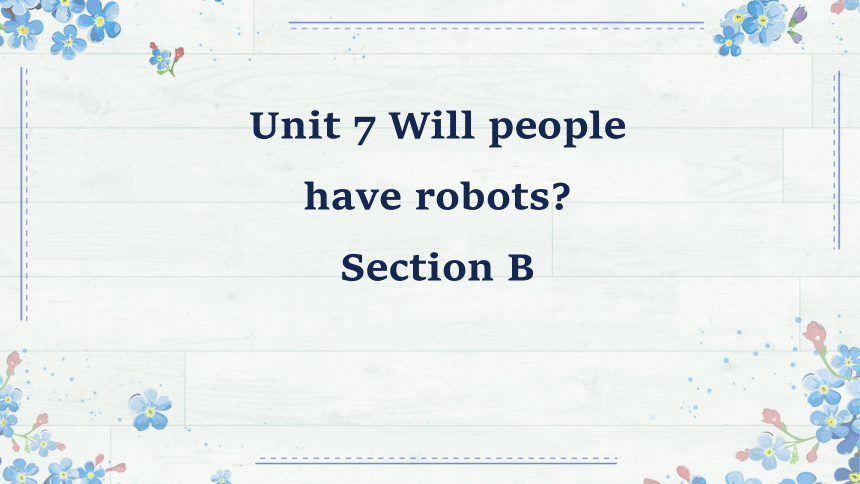 | |
| 格式 | pptx | ||
| 文件大小 | 4.5MB | ||
| 资源类型 | 教案 | ||
| 版本资源 | 人教新目标(Go for it)版 | ||
| 科目 | 英语 | ||
| 更新时间 | 2023-11-23 10:52:09 | ||
图片预览

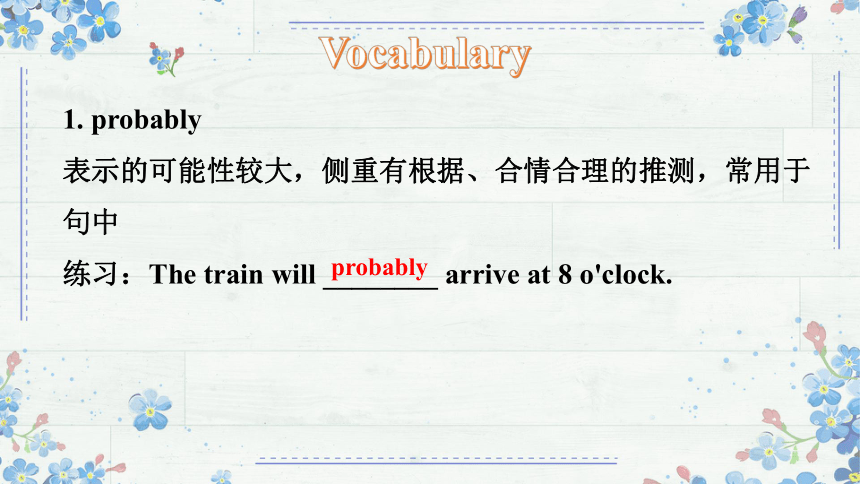
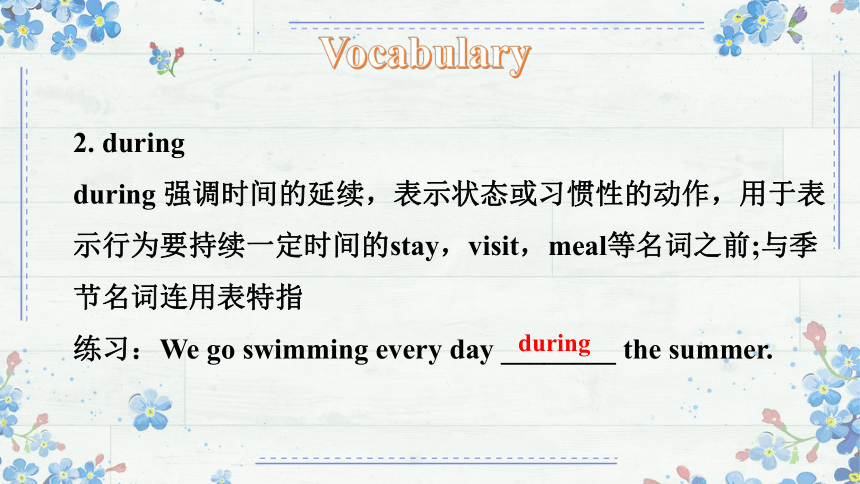
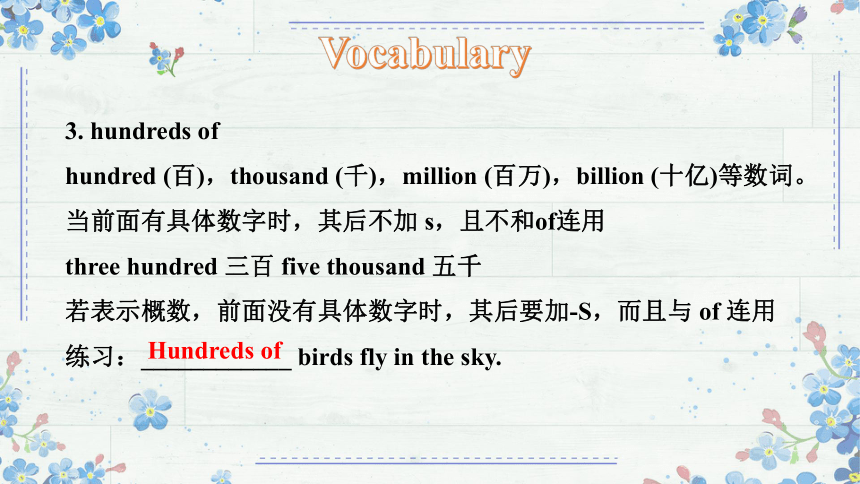
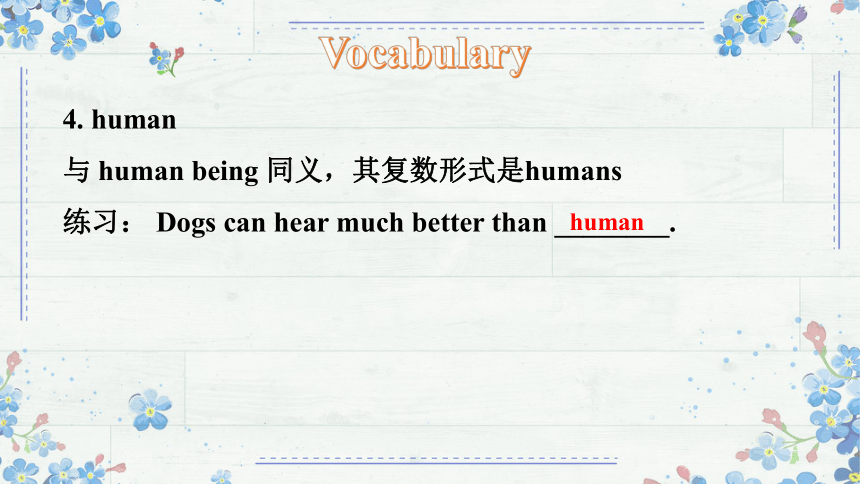
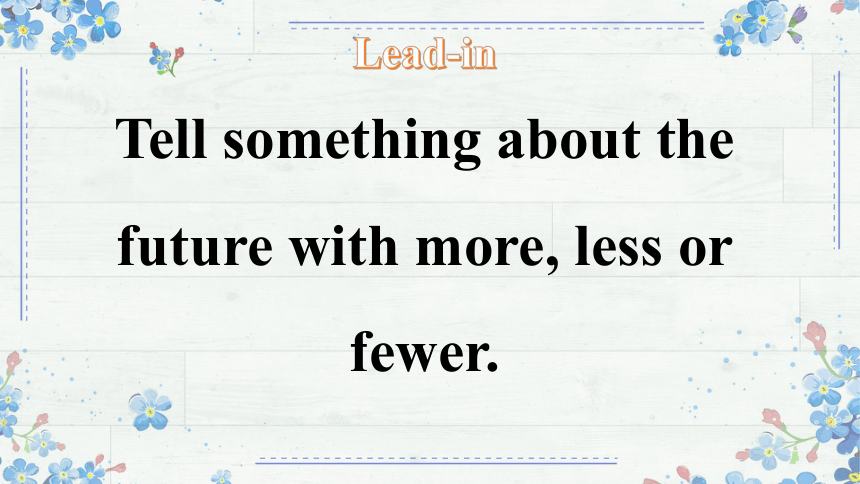
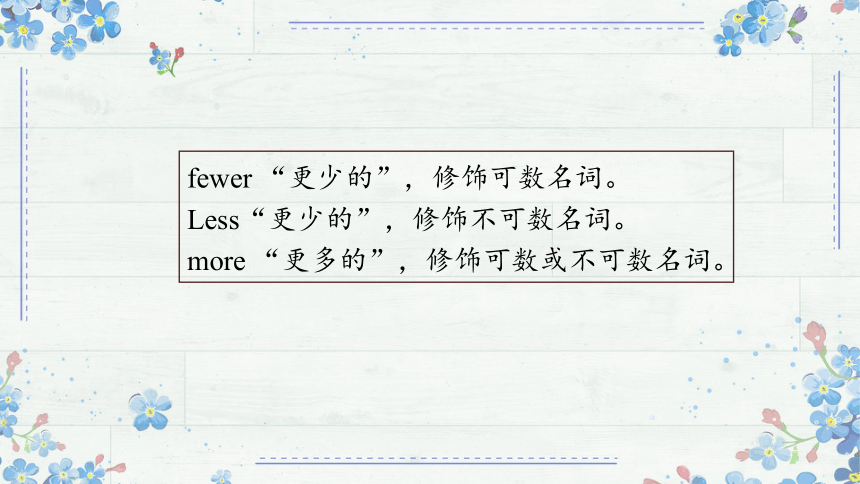
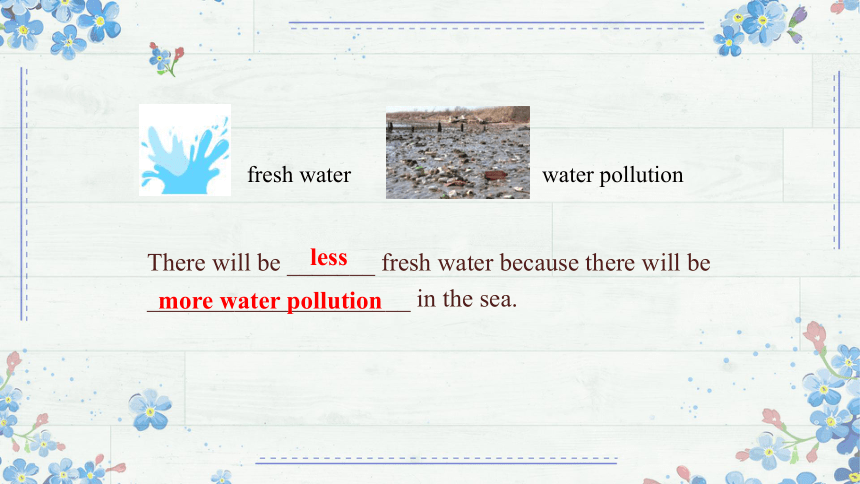
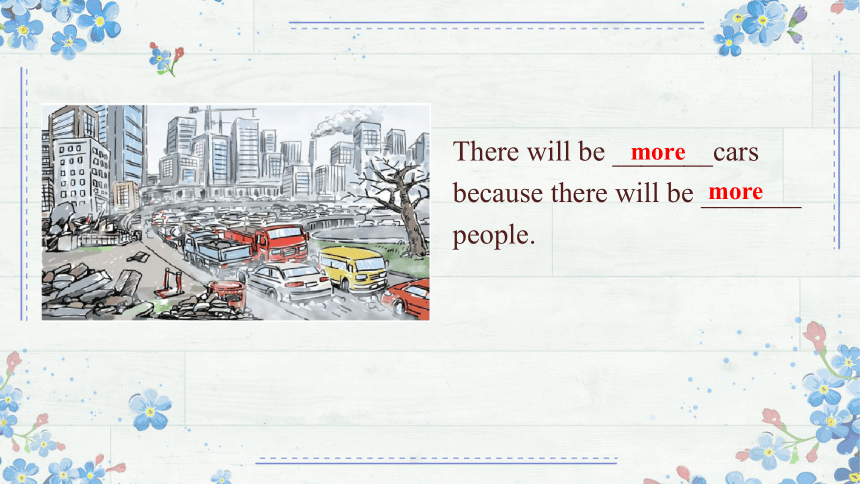
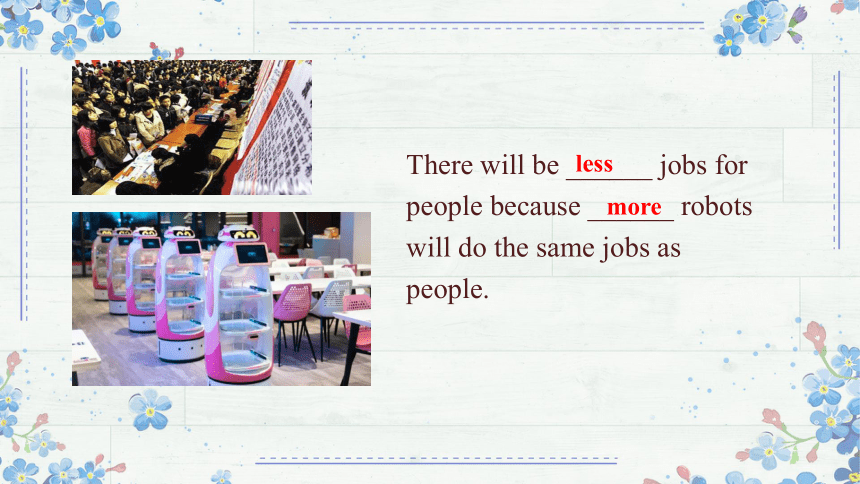
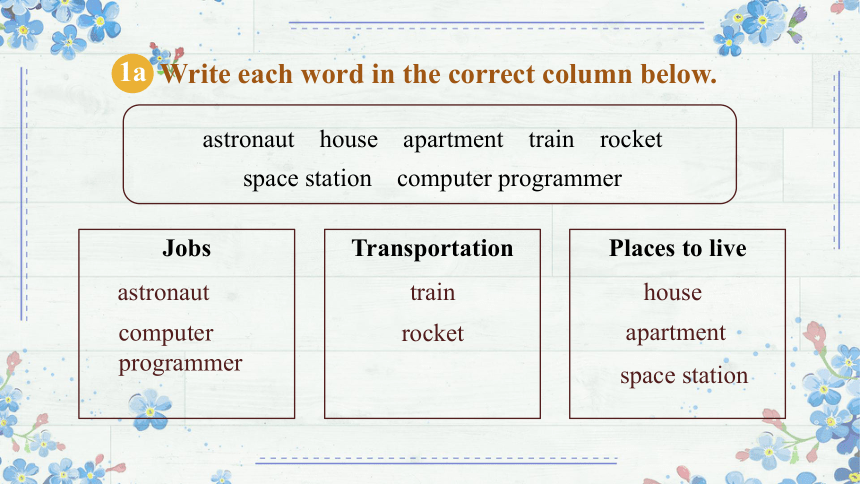
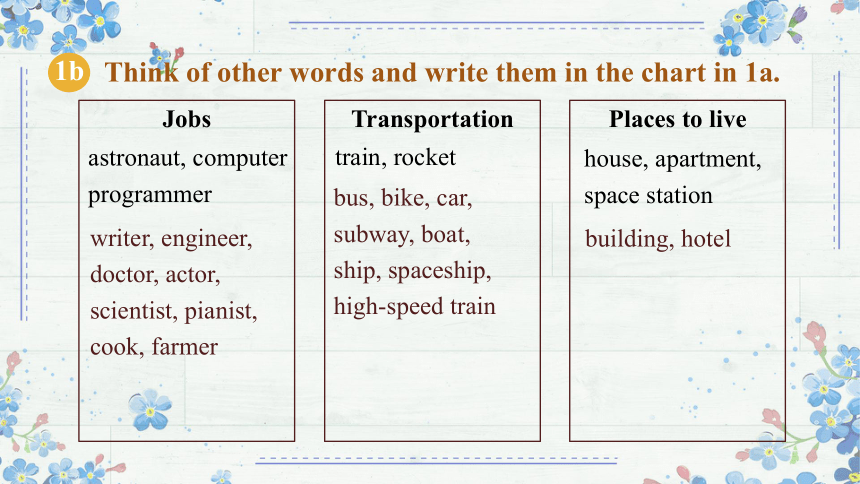
文档简介
(共41张PPT)
Unit 7 Will people have robots
Section B
Vocabulary
1. probably
表示的可能性较大,侧重有根据、合情合理的推测,常用于句中
练习:The train will ________ arrive at 8 o'clock.
probably
Vocabulary
2. during
during 强调时间的延续,表示状态或习惯性的动作,用于表示行为要持续一定时间的stay,visit,meal等名词之前;与季节名词连用表特指
练习:We go swimming every day ________ the summer.
during
Vocabulary
3. hundreds of
hundred (百),thousand (千),million (百万),billion (十亿)等数词。当前面有具体数字时,其后不加 s,且不和of连用
three hundred 三百 five thousand 五千
若表示概数,前面没有具体数字时,其后要加-S,而且与 of 连用
练习:____________ birds fly in the sky.
Hundreds of
Vocabulary
4. human
与 human being 同义,其复数形式是humans
练习: Dogs can hear much better than ________.
human
Lead-in
Tell something about the future with more, less or fewer.
fewer “更少的”,修饰可数名词。
Less“更少的”,修饰不可数名词。
more “更多的”,修饰可数或不可数名词。
There will be _______ fresh water because there will be _____________________ in the sea.
fresh water
water pollution
less
more water pollution
There will be _______cars because there will be _______ people.
more
more
There will be ______ jobs for people because ______ robots will do the same jobs as people.
less
more
1a
Write each word in the correct column below.
Jobs
Transportation
Places to live
astronaut house apartment train rocket
space station computer programmer
astronaut
computer
programmer
train
rocket
house
apartment
space station
1b
Think of other words and write them in the chart in 1a.
Jobs
Transportation
Places to live
train, rocket
astronaut, computer
programmer
house, apartment,
space station
writer, engineer, doctor, actor, scientist, pianist, cook, farmer
bus, bike, car, subway, boat, ship, spaceship, high-speed train
building, hotel
Complete your table.
Jobs Transportation Places to live
1c Look at the pictures and answer.
1
2
3
1d
Listen again. Fill in the blanks with the correct verbs in the box.
am live work lived took will be will live will fly
1.I live in an apartment across the street from here.
2.I ________ near here.
3.I _______ a computer programmer.
4.We in a house in the country.
work
am
lived
5.I the train to school.
6.I an astronaut.
7.I rockets to the moon.
8.I on a space station.
took
will be
will fly
will live
Role-play the conversations with your partner.
Conversation 1
Alexis: Hi, I’m Alexis.
Joe: Nice to meet you, Alexis. I’m Joe.
Alexis: Nice to meet you, Joe. Do you live here in Highville
Joe: Yes. I do. I live in an apartment across the street from here.
Alexis: Oh, really
Joe: Yes. I work near here, too. I’m a computer programmer.
Alexis: A computer programmer That sounds interesting.
Joe: Well, actually it’s kind of boring. I do the same thing every day.
Conversation 2
Alexis: Hey, Joe, is that a picture of you
Joe: Yeah, that was me 10 years ago.
Alexis: So, did you live here in Highville 10 years ago
Joe: No, I lived with my parents in Greenville. We lived in a house in the country. I went to school here in Highville, though.
Alexis: Really That’s pretty far from here. How did you get to school
Joe: Oh, I took the train to school.
1e
Student A is Alexis and Student B is Joe. Talk about Joe’s life now, 10 years ago and 10 years from now.
Where did you live ten years ago
Where do you live
I lived in a house in the country.
I live in village.
Where will you live in ten years
I will live in the space station.
1.I took the train to school. 我曾经乘火车去上学。
“take/ride+a(n)/the+交通工具名词”意为“乘……”,其中,交通工具名词前必须有冠词或形容词性物主代词修饰。
e.g. She often takes a taxi to go to work. 她经常乘出租车去上班。
He usually rides his bike to the bus station.
他通常骑自行车去公交车站。
2.I will live on a space station. 我将住在太空站。
space 不可数名词,意为“太空;空间”,前面一般不加 the,但被形容词修饰时可加 the。
e.g. He is traveling in space by spaceship.
他正乘宇宙飞船在太空漫游。
A spaceship is flying in the dark space.
一艘宇宙飞船正在黑暗的宇宙空间飞行。
What do you know about robots
2a
Tell your partner what you know about robots. What do they look like and what can they do
What do robots look like What can robots do
2b
Read the article and match each paragraph with the question it discusses.
Paragraph 1
Paragraph 2
Paragraph 3
Paragraph 4
Will robots think like humans in the future
What will robots be like in the future
What can robots do today
What are robots like in movies
Read and finish the tasks.
Read Para. 1 and answer:
1.In what kind of movies do we sometimes see robots
2.What are they like
Read Para. 2 and complete the sentences.
1.Some robots can help to build _______ in factories.
2.Robots can do ________ jobs many times and never get bored.
When we watch the movies about the future …
They are usually like human servants.
cars
simple
Read Para. 3 and check True or False.
( ) 1.Some robots in Japan are fun to watch because they can
dance and walk.
( ) 2.Scientists are trying to make robots look like animals.
( ) 3.We can make robots move like people and think like a human.
( ) 4.Scientist James White believes that robots will never be able
to think like a human.
T
F
F
T
2d
Fill in the blanks in this paragraph with words from the article.
Some robots are very human-like. They can walk and _______ like people. Some scientists think that in the future they will _______ robots more like humans. This may not _______ in the near future, but at some point, robots will even be able to _______ like people. However, some scientists _______ . James White believes that robots will not be able to do the _______ things as we can. For example, he thinks that robots will _______ be able to wake up and know where they are. Which side do you _______ with
dance
make
happen
talk
disagree
same
never
agree
2e
What kinds of animals might robots look like in the future What do you think these robots will be able to do Write your ideas and discuss them with your partner.
I think some future robots might look like ________________. They will __________________________________________
__________________________________________________
__________________________________________________
__________________________________________________
__________________________________________________
__________________________________________________
1. However, they agree it may take hundreds of years.
hundreds of 意为“数以百计的”
hundred 修饰名词作定语时,表确数时,hundred用单数形式;
hundred 修饰名词作定语时,表约数时,hundred用复数形式,且后加of,如:Hundreds of people were killed in the traffic accident.
数以百计的人在这起交通事故中死亡。
2.Will robots think like humans in the future 未来的机器人将会像
人类一样思考吗
human 此处用作名词,意为“人;人类”,相当于 human being,常用复数形式 humans。
e.g. We are all humans. 我们都是人类。
human 还可用作形容词,意为“人的;人类的”。
e.g. They are studying human culture.
他们正在研究人类文化。
Books are the ladder of human progress.
书是人类进步的阶梯。
3.However, some scientists believe that although we can make robots
move like people ... 然而, 一些科学家认为尽管我们能够使机器人
像人一样行走……
believe 动词,意为“相信;认为有可能”,其常见用法有:believe+名词,believe+代词,believe+that 从句。
e.g. I don’t believe anything he said. 我不相信他说的任何事情。
当 believe 的主语是第一人称且后接表示否定意义的从句时,须遵循“否定前移”原则。
believe sb. 相信某人所说的话 believe in sb. 信任某人
4.If buildings fall down with people inside, these snake robots can
help look for people under the buildings. 如果建筑物倒塌,人们
被困在里面,这些蛇形机器人就能帮助寻找困在建筑物下面的人。
inside 此处用作副词,意为“在里面;到里面”。此外,inside
还可以用作介词,意为“在……里面”。
e.g. He looked inside, but he could see nothing.
他朝里面看,但什么也没看到。
Go inside the house. 进屋吧。
inside 表示动作或状态,可与动态动词或静态动词连用
in 意为“在……里面”,表示状态
3a
Read Jill’s answer to the question “What will your life be like in the future ” Fill in the blanks with the words in the box.
meet work live look keep wear more less fewer take
In 20 years, I think I’ll be a newspaper reporter. I’ll _____ in Shanghai, because there will be _____ jobs in that city. As a reporter, I think I will _____ lots of interesting people, so I’ll have more friends. I’ll have _____ pets, though, because I’ll have _____ free time. And my apartment will be no good for pets because it’ll be too small. So I’ll probably just _____ a bird. During the week, I’ll _____ smart clothes. On the weekend, I’ll _____ less smart but I’ll be more comfortable. In the future, people will _____ more so they’ll probably have fewer vacations, but I think I’ll _____ a holiday in Hong Kong when possible. One day I’ll even go to Australia.
live
more
meet
fewer
less
keep
wear
look
work
Take
3b
Complete the chart about your life 20 years from now. You can add more items.
What will your… be like
job
home
free time activities
neighborhood
3c
Write about your life 20 years from now. Use 3a and 3b to help you.
___________________________________________________________________________
___________________________________________________________________________
___________________________________________________________________________
___________________________________________________________________________
____________________________________________________________________________________________________________________________________________________________________________________________________________________________________________________________________________________________________________
【写作话题】
本单元围绕"Make predictions"这一话题展开教学活动,学习预言的常用句型。学生在学习本单元时可以大胆地想象、自由地谈论
【写作技巧】
(1)本单元的话题是“Make predictions”,因此要紧紧围绕这一中心话题大胆想象,尽量运用所学的较为规范的词语和句型表达预言
(2)从涉及的内容来看,无论预言能否实现,都需要逐一写出,从而使全文流畅条理清楚。
Writing
(3) 常用短语: in the future; be like; be able to等
(4) 常用句型
What do you think...
There will be...
We should..
I believe...
Writing
1. Put the words in the correct columns in the chart.
job people pollution robot fresh water paper planet
car clean air city free time building money tree
more/fewer more/less
job, people,
robot, planet,
car, city,
building, tree
pollution, fresh water
paper, clean air,
free time, money
2. Fill in the blanks in the conversation.
Girl: Mom, what will the future _____ like
Mom: Well, no one knows what the future will be _______.
Girl: But _____I be beautiful like you _____I be a pilot I want to fly up into the sky.
Mom: You’re already beautiful. And you should study hard. Then you _____ be a pilot.
Girl: OK, I must study harder then.
Mom: But you should also remember that ________will ______both good and bad things in life.
Girl: Oh, but I’m not scared, Mom, because you_____ help me!
be
like
will
Will
will
there
be
will
Unit 7 Will people have robots
Section B
Vocabulary
1. probably
表示的可能性较大,侧重有根据、合情合理的推测,常用于句中
练习:The train will ________ arrive at 8 o'clock.
probably
Vocabulary
2. during
during 强调时间的延续,表示状态或习惯性的动作,用于表示行为要持续一定时间的stay,visit,meal等名词之前;与季节名词连用表特指
练习:We go swimming every day ________ the summer.
during
Vocabulary
3. hundreds of
hundred (百),thousand (千),million (百万),billion (十亿)等数词。当前面有具体数字时,其后不加 s,且不和of连用
three hundred 三百 five thousand 五千
若表示概数,前面没有具体数字时,其后要加-S,而且与 of 连用
练习:____________ birds fly in the sky.
Hundreds of
Vocabulary
4. human
与 human being 同义,其复数形式是humans
练习: Dogs can hear much better than ________.
human
Lead-in
Tell something about the future with more, less or fewer.
fewer “更少的”,修饰可数名词。
Less“更少的”,修饰不可数名词。
more “更多的”,修饰可数或不可数名词。
There will be _______ fresh water because there will be _____________________ in the sea.
fresh water
water pollution
less
more water pollution
There will be _______cars because there will be _______ people.
more
more
There will be ______ jobs for people because ______ robots will do the same jobs as people.
less
more
1a
Write each word in the correct column below.
Jobs
Transportation
Places to live
astronaut house apartment train rocket
space station computer programmer
astronaut
computer
programmer
train
rocket
house
apartment
space station
1b
Think of other words and write them in the chart in 1a.
Jobs
Transportation
Places to live
train, rocket
astronaut, computer
programmer
house, apartment,
space station
writer, engineer, doctor, actor, scientist, pianist, cook, farmer
bus, bike, car, subway, boat, ship, spaceship, high-speed train
building, hotel
Complete your table.
Jobs Transportation Places to live
1c Look at the pictures and answer.
1
2
3
1d
Listen again. Fill in the blanks with the correct verbs in the box.
am live work lived took will be will live will fly
1.I live in an apartment across the street from here.
2.I ________ near here.
3.I _______ a computer programmer.
4.We in a house in the country.
work
am
lived
5.I the train to school.
6.I an astronaut.
7.I rockets to the moon.
8.I on a space station.
took
will be
will fly
will live
Role-play the conversations with your partner.
Conversation 1
Alexis: Hi, I’m Alexis.
Joe: Nice to meet you, Alexis. I’m Joe.
Alexis: Nice to meet you, Joe. Do you live here in Highville
Joe: Yes. I do. I live in an apartment across the street from here.
Alexis: Oh, really
Joe: Yes. I work near here, too. I’m a computer programmer.
Alexis: A computer programmer That sounds interesting.
Joe: Well, actually it’s kind of boring. I do the same thing every day.
Conversation 2
Alexis: Hey, Joe, is that a picture of you
Joe: Yeah, that was me 10 years ago.
Alexis: So, did you live here in Highville 10 years ago
Joe: No, I lived with my parents in Greenville. We lived in a house in the country. I went to school here in Highville, though.
Alexis: Really That’s pretty far from here. How did you get to school
Joe: Oh, I took the train to school.
1e
Student A is Alexis and Student B is Joe. Talk about Joe’s life now, 10 years ago and 10 years from now.
Where did you live ten years ago
Where do you live
I lived in a house in the country.
I live in village.
Where will you live in ten years
I will live in the space station.
1.I took the train to school. 我曾经乘火车去上学。
“take/ride+a(n)/the+交通工具名词”意为“乘……”,其中,交通工具名词前必须有冠词或形容词性物主代词修饰。
e.g. She often takes a taxi to go to work. 她经常乘出租车去上班。
He usually rides his bike to the bus station.
他通常骑自行车去公交车站。
2.I will live on a space station. 我将住在太空站。
space 不可数名词,意为“太空;空间”,前面一般不加 the,但被形容词修饰时可加 the。
e.g. He is traveling in space by spaceship.
他正乘宇宙飞船在太空漫游。
A spaceship is flying in the dark space.
一艘宇宙飞船正在黑暗的宇宙空间飞行。
What do you know about robots
2a
Tell your partner what you know about robots. What do they look like and what can they do
What do robots look like What can robots do
2b
Read the article and match each paragraph with the question it discusses.
Paragraph 1
Paragraph 2
Paragraph 3
Paragraph 4
Will robots think like humans in the future
What will robots be like in the future
What can robots do today
What are robots like in movies
Read and finish the tasks.
Read Para. 1 and answer:
1.In what kind of movies do we sometimes see robots
2.What are they like
Read Para. 2 and complete the sentences.
1.Some robots can help to build _______ in factories.
2.Robots can do ________ jobs many times and never get bored.
When we watch the movies about the future …
They are usually like human servants.
cars
simple
Read Para. 3 and check True or False.
( ) 1.Some robots in Japan are fun to watch because they can
dance and walk.
( ) 2.Scientists are trying to make robots look like animals.
( ) 3.We can make robots move like people and think like a human.
( ) 4.Scientist James White believes that robots will never be able
to think like a human.
T
F
F
T
2d
Fill in the blanks in this paragraph with words from the article.
Some robots are very human-like. They can walk and _______ like people. Some scientists think that in the future they will _______ robots more like humans. This may not _______ in the near future, but at some point, robots will even be able to _______ like people. However, some scientists _______ . James White believes that robots will not be able to do the _______ things as we can. For example, he thinks that robots will _______ be able to wake up and know where they are. Which side do you _______ with
dance
make
happen
talk
disagree
same
never
agree
2e
What kinds of animals might robots look like in the future What do you think these robots will be able to do Write your ideas and discuss them with your partner.
I think some future robots might look like ________________. They will __________________________________________
__________________________________________________
__________________________________________________
__________________________________________________
__________________________________________________
__________________________________________________
1. However, they agree it may take hundreds of years.
hundreds of 意为“数以百计的”
hundred 修饰名词作定语时,表确数时,hundred用单数形式;
hundred 修饰名词作定语时,表约数时,hundred用复数形式,且后加of,如:Hundreds of people were killed in the traffic accident.
数以百计的人在这起交通事故中死亡。
2.Will robots think like humans in the future 未来的机器人将会像
人类一样思考吗
human 此处用作名词,意为“人;人类”,相当于 human being,常用复数形式 humans。
e.g. We are all humans. 我们都是人类。
human 还可用作形容词,意为“人的;人类的”。
e.g. They are studying human culture.
他们正在研究人类文化。
Books are the ladder of human progress.
书是人类进步的阶梯。
3.However, some scientists believe that although we can make robots
move like people ... 然而, 一些科学家认为尽管我们能够使机器人
像人一样行走……
believe 动词,意为“相信;认为有可能”,其常见用法有:believe+名词,believe+代词,believe+that 从句。
e.g. I don’t believe anything he said. 我不相信他说的任何事情。
当 believe 的主语是第一人称且后接表示否定意义的从句时,须遵循“否定前移”原则。
believe sb. 相信某人所说的话 believe in sb. 信任某人
4.If buildings fall down with people inside, these snake robots can
help look for people under the buildings. 如果建筑物倒塌,人们
被困在里面,这些蛇形机器人就能帮助寻找困在建筑物下面的人。
inside 此处用作副词,意为“在里面;到里面”。此外,inside
还可以用作介词,意为“在……里面”。
e.g. He looked inside, but he could see nothing.
他朝里面看,但什么也没看到。
Go inside the house. 进屋吧。
inside 表示动作或状态,可与动态动词或静态动词连用
in 意为“在……里面”,表示状态
3a
Read Jill’s answer to the question “What will your life be like in the future ” Fill in the blanks with the words in the box.
meet work live look keep wear more less fewer take
In 20 years, I think I’ll be a newspaper reporter. I’ll _____ in Shanghai, because there will be _____ jobs in that city. As a reporter, I think I will _____ lots of interesting people, so I’ll have more friends. I’ll have _____ pets, though, because I’ll have _____ free time. And my apartment will be no good for pets because it’ll be too small. So I’ll probably just _____ a bird. During the week, I’ll _____ smart clothes. On the weekend, I’ll _____ less smart but I’ll be more comfortable. In the future, people will _____ more so they’ll probably have fewer vacations, but I think I’ll _____ a holiday in Hong Kong when possible. One day I’ll even go to Australia.
live
more
meet
fewer
less
keep
wear
look
work
Take
3b
Complete the chart about your life 20 years from now. You can add more items.
What will your… be like
job
home
free time activities
neighborhood
3c
Write about your life 20 years from now. Use 3a and 3b to help you.
___________________________________________________________________________
___________________________________________________________________________
___________________________________________________________________________
___________________________________________________________________________
____________________________________________________________________________________________________________________________________________________________________________________________________________________________________________________________________________________________________________
【写作话题】
本单元围绕"Make predictions"这一话题展开教学活动,学习预言的常用句型。学生在学习本单元时可以大胆地想象、自由地谈论
【写作技巧】
(1)本单元的话题是“Make predictions”,因此要紧紧围绕这一中心话题大胆想象,尽量运用所学的较为规范的词语和句型表达预言
(2)从涉及的内容来看,无论预言能否实现,都需要逐一写出,从而使全文流畅条理清楚。
Writing
(3) 常用短语: in the future; be like; be able to等
(4) 常用句型
What do you think...
There will be...
We should..
I believe...
Writing
1. Put the words in the correct columns in the chart.
job people pollution robot fresh water paper planet
car clean air city free time building money tree
more/fewer more/less
job, people,
robot, planet,
car, city,
building, tree
pollution, fresh water
paper, clean air,
free time, money
2. Fill in the blanks in the conversation.
Girl: Mom, what will the future _____ like
Mom: Well, no one knows what the future will be _______.
Girl: But _____I be beautiful like you _____I be a pilot I want to fly up into the sky.
Mom: You’re already beautiful. And you should study hard. Then you _____ be a pilot.
Girl: OK, I must study harder then.
Mom: But you should also remember that ________will ______both good and bad things in life.
Girl: Oh, but I’m not scared, Mom, because you_____ help me!
be
like
will
Will
will
there
be
will
同课章节目录
- Unit 1 Where did you go on vacation?
- Section A
- Section B
- Unit 2 How often do you exercise?
- Section A
- Section B
- Unit 3 I'm more outgoing than my sister.
- Section A
- Section B
- Unit 4 What's the best movie theater?
- Section A
- Section B
- Unit 5 Do you want to watch a game show?
- Section A
- Section B
- Unit 6 I'm going to study computer science.
- Section A
- Section B
- Unit 7 Will people have robots?
- Section A
- Section B
- Unit 8 How do you make a banana milk shake?
- Section A
- Section B
- Unit 9 Can you come to my party?
- Section A
- Section B
- Unit 10 If you go to the party, you'll have a grea
- Section A
- Section B
